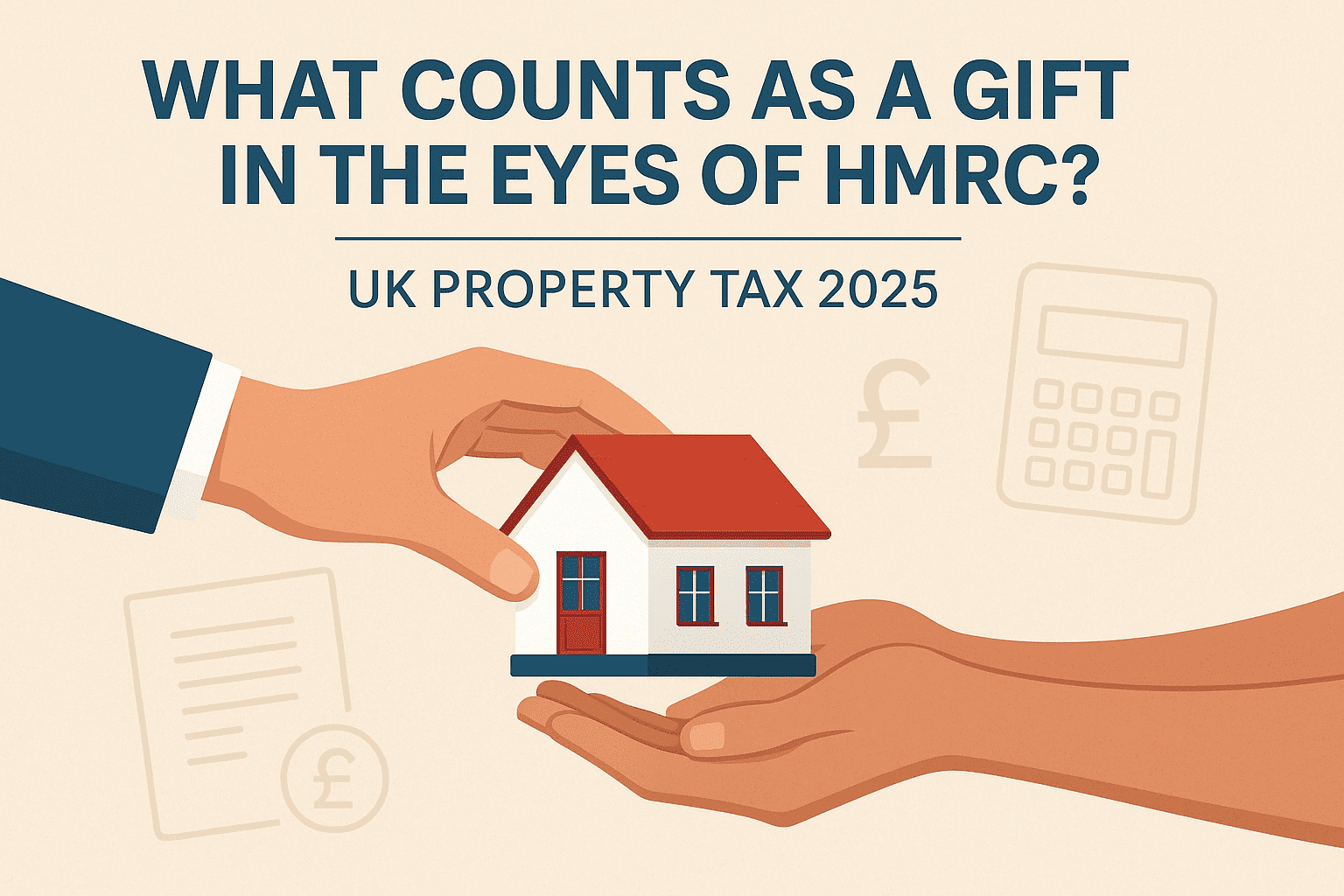Why Parents Gift Property Early
Many parents say: “I’d rather give my children their share now while I’m alive, so there’s no fighting later.”
It’s a natural instinct — you want certainty, fairness, and peace in the family. And sometimes giving property early really can help. Children may use it to get on the housing ladder, generate income, or simply feel secure.
But here’s the catch: gifting property is never just a personal decision. HMRC has very specific rules that decide whether the transfer is treated as a Gift, a Transfer, or still counted as Yours.
And those rules can mean Capital Gains Tax now (CGT on Property, what you need to know), and Inheritance Tax later (What Happens if you die owning a Rental Property), if you don’t plan carefully. .
🎥 Watch: What Counts as a Gift in the Eyes of HMRC?
If you prefer to watch rather than read, here’s my latest video where I explain exactly how HMRC views property gifts, what counts as a disposal, and the key tax traps to avoid.
Then scroll down for the full written guide — including worked examples, HMRC references, and practical tax insights.
So, what exactly does HMRC count as a Gift?
What HMRC Calls a Gift
For tax purposes, a Gift isn’t just something you wrap up and hand over.
- HMRC sees a Gift of property as a disposal at Market Value.
- That means even if no money changes hands, HMRC treats it like you’ve sold the property at full value.
- This applies to second homes, buy-to-lets, and in some cases even your main home.
So if you bought a rental for £150,000 and it’s worth £400,000 today, gifting it to your child is the same as selling it for £400,000 in HMRC’s eyes.
Common Misconceptions
The biggest myth is: “If no money changes hands, there’s no Tax.”
The reality is:
- Capital Gains Tax (CGT) may apply immediately.
- Inheritance Tax (IHT) can still apply if you die within 7 years of the gift.
So “No Cash” doesn’t mean “No Tax”.
Gifting to Minor Children – The Settlements Rule
A frequent question is: “If I gift a rental property to my child who’s under 18, do they need to register for Self Assessment to declare the rental income?”
The answer is usually no.
Under ITTOIA 2005, Section 629, and explained in HMRC’s TSEM4300 guidance, income from assets gifted by a Parent to a minor child is still taxed on the Parent.
In HMRC’s words:
“Income … belonging to a minor child … is deemed to be that of the Parent for tax purposes, and is not treated as the child’s.”
What this means in practice:
- You still declare the rental income on your Tax Return.
- Your child doesn’t register for Self Assessment until they’re 18.
- Gifts from Grandparents or through some Trusts may be treated differently.
Gifting vs Transferring — Is There a Difference?
People often ask: “Is gifting different from transferring?”
- Gifting means you hand over ownership without receiving money. HMRC still uses the market value.
- Transferring is broader — it can include Gifts, sales at undervalue, or moving property into a company or Trust.
- In both cases, HMRC looks at market value, not the amount actually paid.
So whether you call it a Gift, a Transfer, or a “Sale for £1”, HMRC doesn’t care — the tax position is the same.
Practical Example
Imagine you bought a buy-to-let for £150,000. Today it’s worth £400,000.
- You gift it to your son.
- HMRC says: “That’s a disposal at £400,000.”
- You face CGT on the gain (£250,000 less your allowance).
- If you die within 7 years, IHT could still apply.
Key Takeaways
- A Gift of property is a disposal at market value.
- No Cash ≠ No Tax — CGT may apply immediately, IHT can still apply later.
- Gifts to minor children are usually taxed on the Parent under the Settlements rule.
- Whether you call it a Gift or Transfer, HMRC taxes based on true market value.
Common Questions About IHT and Gifting
Q1. If a parent gifts their property to a child, pays full market rent, and dies within two years, what happens for Inheritance Tax?
Because full rent is paid, it’s not a Gift with Reservation — HMRC accepts it as a genuine transfer.
However, if the parent dies within seven years, the gift is still treated as a Potentially Exempt Transfer (PET), so the property’s value is counted back into the estate for IHT.
There’s no taper relief within the first three years, so if death occurs within two years, full IHT (40%) can apply on that gifted value, after allowances.
Q2. Does the Residence Nil Rate Band (RNRB) depend on whether the child is an adult or a minor?
No — RNRB applies if the property passes to a direct descendant, whether that’s an adult child or a minor.
The key test is who inherits, not their age.
RNRB can also apply if the property passes into a bare trust or a trust giving the child an absolute right to the home.
However, if it passes into a discretionary trust (where trustees choose who benefits), the RNRB is lost until the asset is appointed out absolutely to the child.
👉 See our next article, Capital Gains Tax on Gifting Property Explained (2025/26) to understand how CGT is calculated when you transfer property to family, even if no money changes hands.
Final Word
Gifting property is often about family peace of mind. But if you don’t structure it correctly, you could face an unexpected tax bill and your estate may not save anything at all.
If you’re thinking about gifting property, take advice first. The right approach could save your family thousands — and avoid the disputes you’re trying to prevent.
📞 Book a property tax review today to see what’s right for your family
